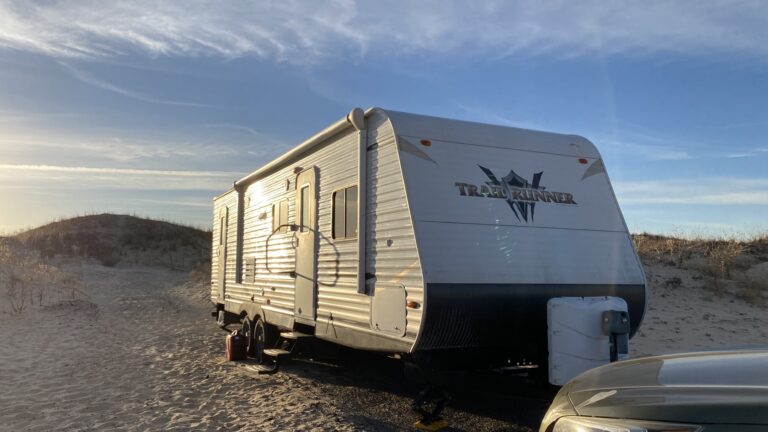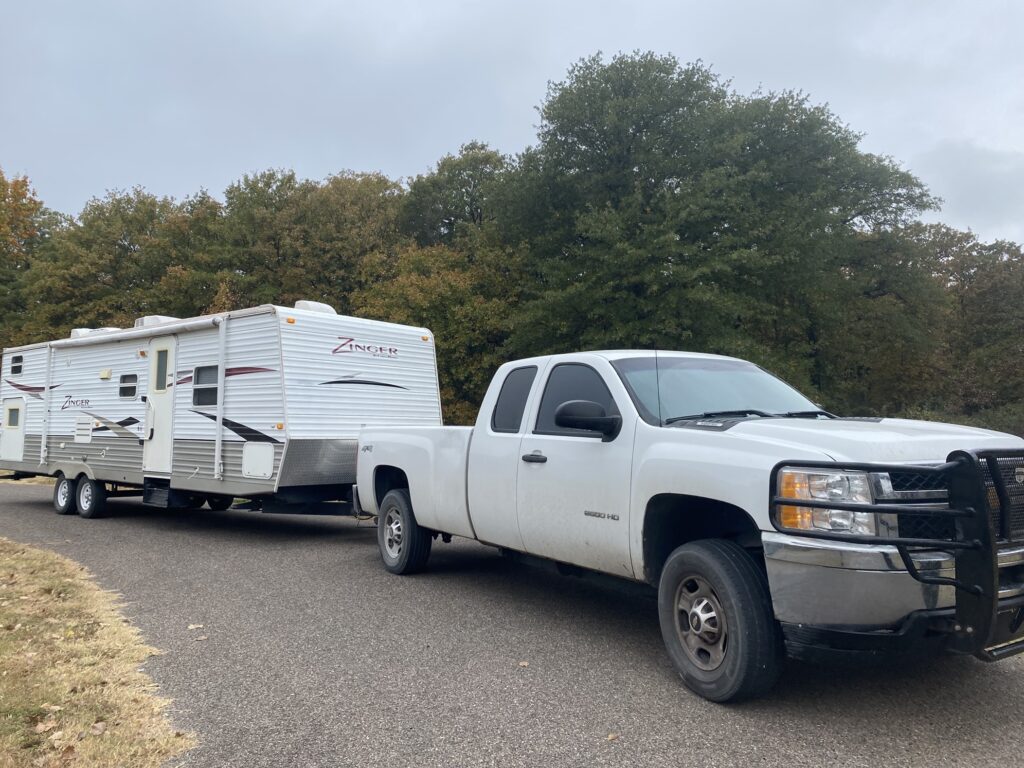
In the past ten years, we have owned and lived in four different RVs: a tiny travel trailer with no slides, a large travel trailer with a super slide, a bunkhouse class C motorhome, and our current medium-sized travel trailer. If I’m being honest, the class C was by far my favorite home-on-wheels we’ve ever owned. That said, travel trailer pros and cons are worth thinking about as you figure out which RV type is right for you.
In this article, I will explore travel trailer pros and cons. My hope is that my experiences will help you decide whether this is the type of rig for you.

Pros of a Travel Trailer
What travel trailer pros and cons should you know? Let’s start with the pros. Some of my favorite things about our current rig are as follows.
Fewer Engines to Care For
One of the things I really didn’t like about living in the motorhome was that we had to care for both our motorhome engine and our car engine. As you might imagine, this can get expensive quickly. Not only that, but when the motorhome did have to go to the shop, we were without a place to live. If you don’t live in your RV, this isn’t a problem—but if you do, it is a major inconvenience.
Being in a travel trailer means our home-on-wheels never has to go to the shop for engine-related repairs. It also means we save a lot of money on engine maintenance since we only have one vehicle to care for.
Cheaper Tires
There’s no way around the fact that tires are expensive, and because we travel so much, we go through a lot of tires. Fortunately, the tires for our travel trailer are much less expensive than motorhome tires and our current rig requires fewer tires total. This saves us quite a bit of money each time we have to replace the tires, something I really appreciate.
Easier to Modify Safely
Because we live in our RVs full time, we like to modify them to suit our tastes and lifestyle. In our travel trailers, this is relatively easy.
Because nobody rides in the trailer, we can change to regular household furniture without safety concerns. And while we do try to secure everything, if something isn’t bolted down well, it isn’t going to hurt somebody.
Meanwhile, safely changing things in a motorhome—like the couch where the seatbelts are—is a whole affair. Likewise, every time we add something to the rig, we have to consider whether it can be secured in such a way that our passengers will be safe during travel.
Less Expensive
The reason we ended up in a travel trailer again after our motorhome broke down was not because we particularly wanted a travel trailer. It was actually because it was what we could afford.
Generally speaking, travel trailers are the most budget-friendly RV option out there, and because they tend to be lighter than fifth wheel models, they can usually be towed by smaller, less expensive trucks. This makes a travel trailer an excellent option for an RVer on a budget.

Cons of a Travel Trailer
The drawbacks of a travel trailer? Well, there are plenty of those as well. Below are the biggest drawbacks.
Hitching Up and Towing
My least favorite thing about bumper pull trailers? The hitching up process.
In our motorhome, we were able to pack up and go in half an hour or less. In the trailer, moving is a whole ordeal that can take an hour or more, depending on how much stuff we have to gather up and put away. This is especially annoying for people like me who do not like getting up in the morning, because it means getting up earlier than usual to get everything packed away and hitched up before checkout time.
Once we’re hitched up, we then have to tow the trailer. To be honest, I don’t do this job. It scares me too much. That said, I do know from what my husband tells me that driving and parking the trailer is much trickier than driving and parking the motorhome ever was.
Large Truck as Daily Driver
Obviously, we have to have a way to get around once our RV is parked. Since we need a big truck to tow our trailer, and because towing a car behind the trailer is a terrifying thought, our big truck is our daily driver.
On the one hand, this is nice because it’s the only engine we have to maintain. That said, I absolutely despise driving the big truck everywhere, especially when we’re visiting big cities. The gas mileage on the truck is abhorrent and parking it requires much more work, and sometimes takes some pre-planning whenever parking garages or tight spaces are involved.
On a couple of occasions, I have driven our car behind the truck and trailer. This allowed us to have the car as a daily driver, but increased our gas costs by quite a lot and meant we couldn’t travel as a family, something that definitely took away from the fun.
Smaller Space and Less Storage
I have found that overall, travel trailers tend to feel much more cramped than other types of RVs. The ceilings are lower than they would be in a fifth wheel or motorhome, and this definitely contributes to that feeling. On top of that, every trailer we’ve ever owned has had far less storage space than other RVs of similar lengths.
There tend to be fewer outside storage bays, and they are often less insulated and more leak-prone. On top of that, the storage inside our trailers has often been difficult to access, something we didn’t experience so much in our motorhome (or in our friend’s fifth wheel when they let us use it for a week).
Less easy-to-access storage space means things don’t get put away properly all the time, which results in a space that feels cluttered and cramped.
Lower Quality
Another enormous drawback when it comes to travel trailers? The build quality. In general, RVs really aren’t built to last, but because bumper pulls are the budget-friendly option, they tend to be some of the least sturdy RVs on the market.
Even just walking around in our trailer, I can feel that it is cheaply made in comparison to a motorhome. The floors bend under our feet, the countertops peel when they get wet, and the cabinet doors feel flimsy. None of these things makes the RV unliveable, but they do definitely make the space a little less comfortable.
On top of all of that, we have more issues with leaks in our trailers than we did in our motorhome. This is probably also due to the build quality, and it’s something we have to really stay on top of to avoid water damage.
Final Thoughts
There you have it, the travel trailer pros and cons. As mentioned above, I really did prefer our motorhome over our current trailer trailer. It just felt sturdier and the ability to get up and go quickly without worrying about hitching up was amazing. For this reason, I’d recommend a motorhome to anyone looking to spend a lot of time in their RV, especially if they plan to move often.
That said, when we stayed in our friend’s fifth wheel for a week, I found that while it did offer more space, I didn’t feel like it was really that much better in terms of quality or livability. Therefore, if you’re looking for a towable and are on a strict budget, a travel trailer is probably a fine choice, especially if you only plan to be in the rig part of the time.

